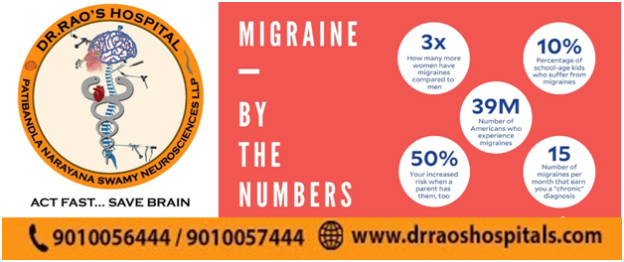Migraine – Symptoms, Signs, Causes, Types, and Treatment
Migraine is a neurological disease that is common in people of Guntur. In migraines, people experience severe headaches. Vomiting and nausea are common side effects of headaches. In migraines, one may also experience sensitivity to sound and light, problems in speech, etc. Migraine can occur in any age group. If you have migraine problems running in your family, it is more likely you will also experience migraines. In case you experience migraine headaches, it is advisable to visit Rao hospital Guntur, which is one of the best neurology hospitals in Guntur. This article discusses migraine symptoms, causes, types, and treatment.
What is a migraine?
Migraine is a neurological condition in which one experiences severe headaches, nausea, and vomiting. One may also experience sensitivity to light and sound. Migraine is more common in women than men. The most common migraines are migraines with aura and without aura. We will study each of them in detail later in the article.
What are the common signs and symptoms of migraine?

Migraine occurs in stages. The symptoms of migraine may differ depending on the stage.
Prodrome stage:
In this stage of migraine, symptoms are experienced a few days before the headache starts. The common symptoms experienced in this stage include the following-
Increased hunger
Tiredness
Stiffness in the neck
Feeling depressed
Aura:
This occurs after the prodrome stage. The common problems experienced in this stage include the following-
Problems in speaking
Vision problems
Sensation problems
Attack:
In this phase, a severe headache is experienced. The common symptoms in this stage include the following-
Nausea
Vomiting
Very severe pain in your head
Sensitivity to light and sound
Postdrome Phase:
The following symptoms characterize this phase-
Extreme mood swings
Headaches
If you experience any of the above symptoms, you should visit the best neurologist in Guntur immediately for proper treatment. When left untreated, migraines may become severe and last longer.
What are the possible causes of migraine?

The actual cause of migraine is not yet known. However, certain risk factors may lead to migraine. Some of them are as follows-
- Changes in weather
- Less water intake in the body
- Hormone changes
- Increased stress
- Irregular eating schedule and skipping meals
- Improper sleep
- Specific medications
- Smoking and alcohol
Your neurologist may ask you in Guntur to keep a record of the things that you ate or the medicines you took before the onset of your migraine. This may help identify the triggers that lead to migraines and thus avoid them to reduce and treat them. According to dnaindia
How can migraines be diagnosed?
Doctors in Guntur can diagnose migraines by examining symptoms, medical conditions, and family history. Various tests are used to diagnose migraines.
What are the different types of migraines?
The following are the different types of migraine seen in people of Guntur
Migraine without Aura:
This is one of the most common types of migraine. People with this type of migraine have had at least five attacks that have these characteristics:
Headaches lasting for 4-72 hours if timely treatment is not provided.
Moderate or severe headache on one side of the head
Headaches accompanied by sensitivity to light and sound and nausea.
Migraine with Aura:
This is also one of the common types of migraine. People with this type of migraine have had at least 2 attacks that have these characteristics:
Vision problems
Speech problems
Vertigo
Sensory problems
Chronic migraines:
People with chronic migraines experience severe headaches. They may also experience the following-
Depression
Other chronic pain
Acute migraines:
This type of migraine is not chronic. People experience less severe headaches than chronic migraines in this type of migraine.
There are other types of migraines, such as an optical migraine(affects one of the eyes), Acephalgic migraine(migraine with no headaches), hormonal migraines(caused by changes in hormones like estrogen), abdominal migraine(experiencing stomach-ache), among others.
How to treat migraines?
Migraine is a very fatal condition. So, there are treatment options available to treat migraines. Migraines can’t be completely cured, but these treatment options can help control and reduce migraines to a great extent.
- Lifestyle changes include proper sleep, regular exercise, stress management through yoga and meditation, avoiding triggers that lead to migraine attacks, and drinking plenty of water.
- Medications like NSAIDs, Triptans, and CGRP analogs Are superior.
- Surgical interventions
- Acupressure and acupuncture also help treat migraines
- Home remedies like lying in a quiet, dark room and placing a cold cloth over your head may also help.
It is advisable to visit a specialist in Guntur in case you experience severe migraine headaches to get proper treatment and to manage your migraines.
Conclusion
This article helped us understand migraines’ symptoms, causes, types, treatments, etc. Regular exercise, drinking plenty of water, and managing stress through yoga and meditation can help greatly in controlling and managing migraines. If you experience severe migraine headaches, kindly visit a neurologist in Guntur immediately to get proper treatment and relief from the severe headache that hinders you from performing your day-to-day activities.
Dr. Rao’s Contact Information:
- Phone: 9010056444, 9010057444
- Email: info@drraoshospitals.com
- Address: Old Bank St, GV Thota, beside AK Biryani Point, Guntur, Andhra Pradesh 522001
- Website: Dr. Rao’s Hospital
Your health and well-being are our top priorities. For the best migraine care, trust in the expertise of Dr. Rao and the other leading neurosurgeons in India.

